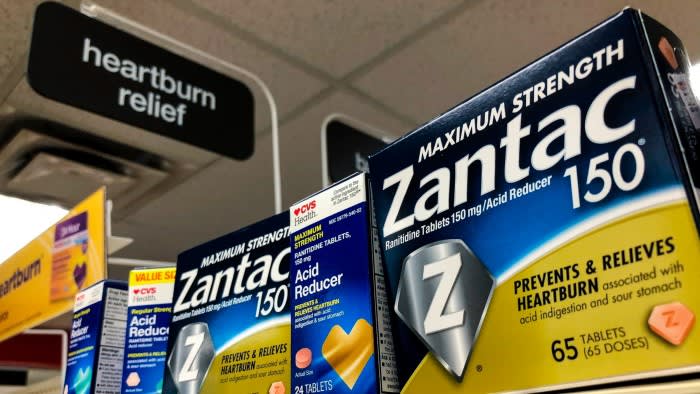Unlock the Editor’s Digest for free
Roula Khalaf, Editor of the FT, selects her favourite stories in this weekly newsletter.
GSK shares jumped on Thursday after the UK drugmaker reached a settlement of up to $2.2bn to resolve the vast majority of cases linked to its heartburn medicine Zantac.
The company late on Wednesday said it had reached agreements with 10 plaintiff firms representing about 80,000 people who had brought product liability cases against it in US state courts. The settlement covers 93 per cent of all claimants.
The decision draws a line under litigation that has dogged the UK drugmaker in recent years, and will enable chief executive Emma Walmsley to tackle other challenges facing the company, including the stuttering rollout of its vaccine for respiratory syncytial virus (RSV), a common winter illness.
Shares in the London-listed company climbed 6 per cent in early trading, before closing up 3.2 per cent, as the settlement came in below analysts’ expectations.
One investor said the decision removed the “distraction” of Zantac to enable Walmsley and her team to focus on the rest of the business. It could also encourage potential investors who might normally “refuse to touch anything that has any litigation risk” to buy GSK stock, they added. The group’s shares trade at a steep discount to many of its rivals.
But Peter Welford, an analyst at Jefferies, said enthusiasm about the Zantac verdict would be “capped” by lingering questions over sales of the company’s RSV and shingles vaccines.
GSK did not accept any liability and continues to question the science behind claims that Zantac caused cancer.
Concerns about the drug first emerged in 2019 when a laboratory in Connecticut — Valisure — alleged it found high levels of a carcinogen in ranitidine, the active ingredient of Zantac.
But it was only when an analyst note from Morgan Stanley in August 2022 estimated potential total liability of up to $45bn that investors took fright. The note put GSK’s potential exposure at up to $27bn and led pharmaceutical groups that had marketed the drug since it was first approved in 1983 to lose £30bn in market capitalisation in a matter of days.
Pfizer and Sanofi, which also marketed the drug, have reached settlements, although German drugmaker Boehringer Ingelheim is continuing with litigation. GSK also said it had reached a separate $70mn settlement with Valisure on Wednesday.
Settlement discussions were spurred by a Delaware judge’s decision in May to allow the plaintiffs’ scientists to testify that the drug caused cancer. The ruling led to a 10 per cent drop in GSK’s share price. The parties sped up negotiations after a subsequent decision by Delaware supreme court judges in August to review that ruling, people familiar with matter said.
“That definitely prompted both sides to roll up their sleeves and get it done,” said Brent Wisner, an attorney from Los Angeles law firm Wisner Baum, which is leading the trial for claimants alongside another firm, Moore Law Group. The resolution was a “great outcome for people who suffered cancer”, he added.
GSK expects to reach settlements with the remaining 7 per cent of plaintiffs, represented by smaller law firms but has not ruled out that the cases could proceed to trials.
In June, a US Food and Drug Administration committee unexpectedly recommended limiting use of the company’s RSV jab Arexvy, lowering expectations of its sales for 2024. The company also reported lower than expected sales of its Shingrix vaccine for shingles in the first half of the year.
In an attempt to reassure regulators over the RSV vaccine’s efficacy, GSK reported it provides about 50 per cent protection in the third year after it is delivered and no cases of Guillain-Barré syndrome, an immune disease that had led to concerns for the FDA committee.
GSK will report a charge in its upcoming results for the third quarter of 2024 of £1.8bn relating to the settlement, adding that there would be no impact to its investment plans as a result.
https://www.ft.com/content/c8e35f8b-d956-4d54-8cae-58dbf8377ae3


